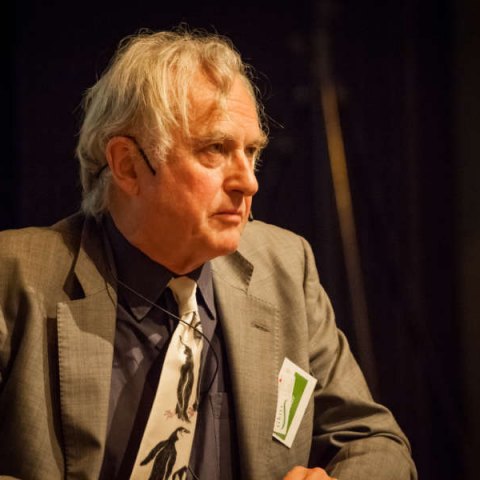History
2020
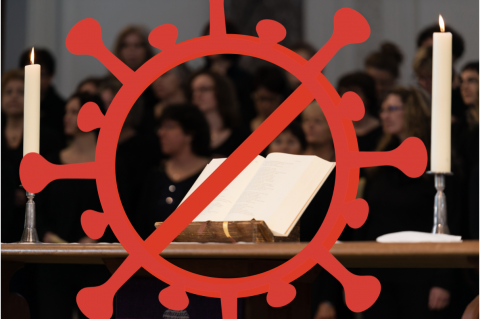
A cancelled Day of Apostasy, a postponed Denkfest, virtual beers instead of real ones: In 2020, many things are going differently than expected. And yet we can get involved in some ways: through our offer of humanist conversations, through the newly founded help for secular refugees, through a criminal complaint against Bishop Morerod or through our criticism of the special regulation for church services during the pandemic. Despite the many challenges, many members can also take along something positive from the year:
«We had time to clear out - materially, spiritually and mentally.» Margrit Diethelm Kessler (83), Zurich Section.
«The positive experience: long, quiet weekends without hectic, a liberatingly empty agenda, taking a breather, emerging boredom.» Daniel Aellig (56), Bern Section.
«Creativity was fostered in many areas, for example in communication through virtual presentations and meetings, in marketing products and services, and in the way we learned to show our warmth and appreciation to others despite limitations.» Olivier Braun (73), Winterthur Section.
You can read all quotes in the 2020 Annual Report (german).
2019
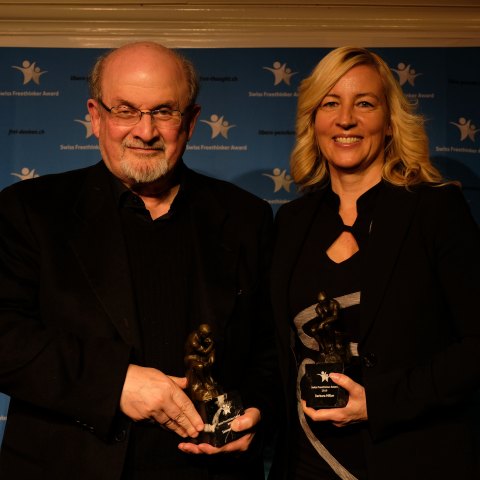
Filmmaker Barbara Miller and author Salman Rushdie receive the 2019 Freethinker Prize in recognition of their artistic work and their commitment to an enlightened world, to upholding humanist values and defending freedom of art and expression.
At the Assembly of Delegates, the Freethinkers Association creates in its statutes the possibility for regional groups which, unlike sections, do not organise themselves as separate associations. It thus simplifies activities in regions that want to make do with the leanest possible structures.
2018
The French-speaking sections Vaud and Geneva merge to Libre Pensée Romandie, with Thierry Dewier becoming section president. Camp Quest is for the first time held in two languages, German and French. In June, the web page frei-denken.ch appears in a new design. In autumn, the publication “frei denken” appears with a new layout.
2017
The third edition of the science festival "Denkfest" is dedicated to the topic "Reformations of thought". Simone Krüsi takes over the management of the office.
2016
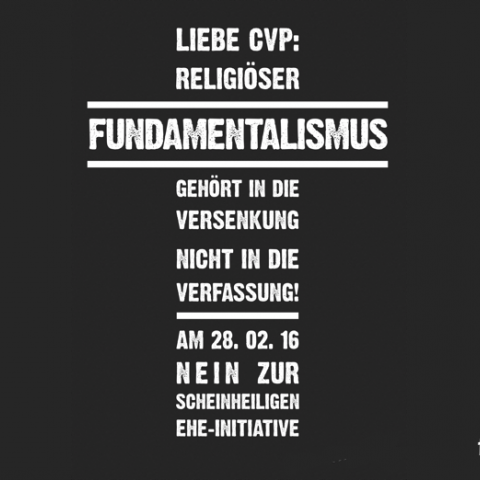
The Freethinkers start a poster campaign and take a stand against the CVP's marriage initiative, which wants to prevent same-sex marriage by means of a constitutional amendment.
The Berne Section presents its study on the use and financing of social services by the national churches. The result: only 7% of Bernese people use these services.
2015
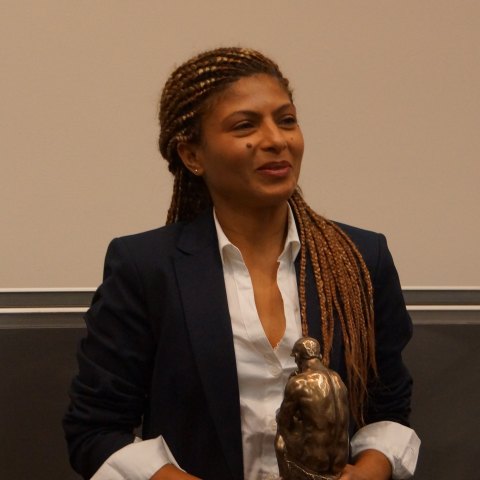
The Freethinker Prize is awarded for the first time and goes to Ensaf Haidar, Raif Badawi and Waleed Abulkhair. Ensaf Haidar receives it personally at an event at the University of Zurich.
Following homophobic statements by the Bishop of Chur, Vitus Huonder, the Freethinkers are calling on Catholics to consider leaving the church with a much-noticed poster campaign.
2014
The second edition of the knowledge festival Denkfest takes place in Zurich. Michael Hengartner, Rector of the University of Zurich, delivers the greeting message. Speakers include the evolutionary biologist Richard Dawkins, the neuroscientist Suzana Herculano-Houzel and the cabaret artist Gunkl.
2013
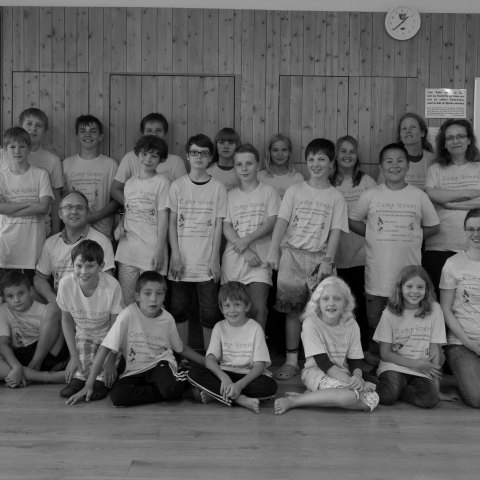
Andreas Kyriacou, initiator of Denkfest and Camp Quest Switzerland, is elected as the new president. Camp Quest, a scientific-humanistic summer camp, takes place for the first time.
2011
The FVS launches the science festival: Science. Critical Thinking. Intelligent conversation.
2010
The FVS supports the Valais teacher Valentin Abgottspon who was dismissed without notice because he refused to have a crucifix on the wall of his class room. The Valais cantonal court of law reversed the dismissal in November 2012.
2009
The FVS launches the international campaign “There probably is no God...” in Switzerland and provokes a country-wide debate on religious freedom and censorship.
100 Years Free-Thinkers Association in Switzerland – 100 Years Commitment for Laicism and Humanism
From about 1870 onwards, anti-clerical people organised themselves in various Swiss townships. On 12 April 1908, the establishment of the “Deutschschweizer Freidenkerbund” in Zurich created the basis for a country-wide unified movement.
Ab ca. 1870 organisierten sich die Antiklerikalen in verschiedenen Städten in der Schweiz. Am 12. April 1908 schuf die Gründung des „Deutschschweizer Freidenkerbundes“ in Zürich die Basis für eine landesweit geeinte Bewegung.
Aims of the FVS
- Promotion of a science-aligned ideology and an ethic that is free from dogma.
- Separation of state and church: Freedom of faith and speech, equal rights of all ideological groups and their independence from the state.
- Separation of religion and school: Knowledge about the various religions shall be taught in the cultural subjects History, Geography, Arts and Literature; non-religious ethics tuition in state schools.
- Offering alternatives to religious services: Member services, rituals.
- Commitment for humane living conditions and protection of the environment.
History of the FVS
Religious circles – in particular the established churches – attacked the movement in a militant manner, defamed it and took it to court. During World War II it was attacked using political means (Godless debate in the National Council in 1933). During the Cold War it also became the focus of State Protection. Towards the end of the 20th century it appeared as if society’s laicism was only a matter of time. Resignations from churches increased massively although the movement did not grow in parallel, even though a few new sections were founded. Following the terrorist attacks of 11 September 2001, religious commitment became once more a social question in Switzerland. Since then the FVS senses a growing interest and gradually increasing membership numbers.
The FVS in the 21st Century
In view of the near impossibility of solving the recognition of religious denominations by legal means, the FVS considers as highly topical the old demand for a clear separation of state and churches/religions. Faced with the religions’ claim for power and authority, it strongly campaigns for a democratic discourse on ethnic standards and for binding education in ethnics at state schools, which takes seriously the need for personal ethnic orientation and which enables people to participate in a democratic value discourse. In this discourse the FVS sees itself as representing the interests of the 11% Swiss people without a creed (Year 2000 census). In a campaign during the jubilee year 2008, it calls on all people without a creed to publicly declare their position.
FVS Numbers
In 2012, the FVS had about 1,900 member in 13 sections. According to a poll carried out in the autumn of 2007, 64% of the members consider themselves as atheists, 22 as agnostics, 2% as pantheists. 8% prefer a different description (humanists or similar) and for 4% none of these descriptions match.

